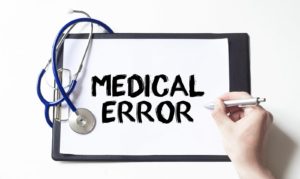 Medical errors can be scary, but they can also have a devastating impact on the health and well-being of every person. Medical errors can range from getting the wrong test in an emergency room to losing a limb in a surgical procedure intended for another patient.
Medical errors can be scary, but they can also have a devastating impact on the health and well-being of every person. Medical errors can range from getting the wrong test in an emergency room to losing a limb in a surgical procedure intended for another patient.
If you have suffered because of a medical error, you may have the option of contacting a medical malpractice lawyer to find out what legal options you have. Medical errors are not only the responsibility of a physician, but these mistakes also often fall on others, including nurses, hospitals, and anesthesiologists.
Frequency of Medical Errors Is Concerning
Across the United States, medical errors account for one-third of all deaths according to a study from Johns Hopkins Medicine. It is important to keep another thing in mind. These are not simply numbers. Each number represents a person and a family who is left to deal with the realization that, if an error was not made, their loved one would still be alive.
Not all medical errors kill patients, but they leave many victims to deal with serious consequences. Sometimes a victim of a medical error has to suffer for a lifetime with the resulting issues caused by an error.
Types of Medical Errors
The problem with medical errors is that they can occur at any stage of life. From birth or later in life, these errors can create a whole range of health problems or exacerbate existing ones.
Common medical errors include:
- Misdiagnosis or failure to diagnose - if a doctor fails to diagnose a disease like cancer or heart issues, they jeopardize a patient’s care. A misdiagnosis could mean improper treatment that could cause a host of other medical problems.
- Prescription errors - a mistake with a prescription can jeopardize the health and well-being of a patient. Someone who has low blood pressure and is given a high blood pressure prescription medication in error can lose their life.
- Surgical errors - surgical procedures are dangerous regardless of your age. When doctors make a mistake is during surgery, a patient can lose their life. When doctors perform the wrong surgical procedure on a patient, the patient may need a second procedure to correct the first, plus the proper procedure.
- Anesthesia errors - these types of mistakes can be deadly. An over-anesthetized patient could suffer irreversible harm. The wrong anesthesia could result in a patient having an allergic reaction that can lead to other poor outcomes.
- Childbirth errors - when a mother gives birth, doctors must monitor the baby for distress. Numerous childbirth errors can result in a whole host of disorders that a family must cope with. The child could suffer irreversible harm and need life-long care.
- Avoidable delays in treatment - in an illness that requires treatment, any delay should be unacceptable. Avoidable delays that worsen a patient’s condition can create grounds for a medical malpractice suit.
- Insufficient follow-up care - some chronic illnesses require follow-up care. Surgical procedures nearly always require follow-up care. When a physician or other medical professional fails to offer the proper care to a patient, there may be a basis for a medical malpractice lawsuit.
- Failure to take precautions - hospitals, nursing homes, podiatrists, and dental offices are just a few of the places where infections can spread like wildfire. When a medical professional fails to take the proper precautions and a patient is stricken with staph infections or other infections as a result, someone could be held accountable.
- Failure to warn - doctors must explain the dangers of prescription drugs, surgical procedures, or medical devices. Failure to warn a patient of these hazards is negligent and can harm the patient.
While you may think these types of errors do not happen often, it is worth noting that Florida is the third-largest state for reported medical malpractice actions. A medical malpractice attorney in Fort Lauderdale can get compensation for those harmed by medical professionals.
Medical Malpractice Claims and Time Constraints
Florida does not make it easy for a patient to hold their medical team accountable for mistakes. The process for filing a medical malpractice claim has several steps. If you don't handle them properly, you will lose your right to file a claim.
Hiring a law firm with experience filing these claims is so important. The statute of limitations in Florida for medical malpractice claims is two years from when you learned your issues were the result of malpractice. However, this is also complicated because the language “or should have known” means the insurance company will question your claim. Under no circumstances can a victim file a claim later than four years after an accident.
Victims are required to file a notice to the health care provider that states they intend to sue. This is the first step you must take. Additionally, the notification must accompany an affidavit of merit from another medical professional that indicates you have a valid malpractice claim.
The professional whom you have notified then has 90 days to indicate whether they wish to offer a settlement. If not, victims have only 60 days to file a suit. Some circumstances can extend this deadline, but you should discuss this with a Fort Lauderdale medical malpractice attorney. Because this process is often so complicated, it can be imperative that victims have an advocate working on their behalf.
Medical Malpractice Claims Caps on Damages
Victims of medical malpractice are often entitled to compensation for the harm they have suffered at the hands of a professional. It is important to remember that not all poor medical outcomes are a result of malpractice. Sometimes bad outcomes occur. As with any personal injury lawsuit, a victim must demonstrate a negligent act took place.
To prove malpractice, a victim must demonstrate:
- The medical provider owed the patient a duty of care.
- The provider failed to meet the duty of care owed to the patient.
- Because of the failure to meet this duty, the patient suffered an injury or illness.
- The injury or illness resulted in the patient losing time from work, paying additional medical bills, or had other compensable damages.
Once you establish these elements, you may file a claim against the medical professional or establishment for:
- Wages lost - this may include not only wages for days missed from work, but sick days, vacation days, and other perks a victim may have lost due to being out of work. Victims may also have a claim for future lost wages due to being unable to earn as much as they did before the malpractice.
- Medical costs - any medical costs associated with treatment for an injury or illness resulting from malpractice may be compensable. These costs include current as well as future medical treatments. This would include any future surgical procedures, medications, and in-home treatment if needed.
- Other costs - speak with your attorney about other potential economic damages, because you may include things like upgrades to your home to accommodate your injury.
While Florida Statute 766.118 caps non-economic damages, you may claim for pain and suffering, emotional distress, and loss of enjoyment among other areas.
When a victim of medical malpractice loses their life, a family may also file a claim for wrongful death. These family members may also seek lost future wages, funeral and burial costs, and loss of companionship when filing a claim.
Hiring an Attorney to Pursue a Medical Malpractice Claim
Often, victims of medical malpractice avoid hiring an attorney because they feel helpless against a system that seems to work against them.
However, if you believe you have a claim against a medical professional who failed to properly perform their duty, an attorney can help you by:
- Reviewing medical records - an attorney can request a victim’s medical records and have them reviewed thoroughly for evidence of a mistake in the patient’s care or treatment. This is generally the first step in determining the validity of a claim.
- Finding experts - because of the process used in Fort Lauderdale medical malpractice cases, an attorney can identify experts who can speak to the issues that harmed the victim. The law requires the affidavit to file a claim.
- Serving as your advocate - if a medical professional is willing to negotiate a settlement, an attorney can serve as your advocate to make sure you get the settlement you are entitled to for the harm resulting from medical malpractice. If the professional won't settle, your lawyer should prepare to take your case to court and present it to a jury.
Unfortunately, because many people understand the challenges associated with a malpractice claim, only a small number of doctors face the consequences of their actions. Taking the opportunity to meet with an attorney who understands your frustration and is willing to review your case can help you make the best decision for you and your family.
You Pay No Costs for Your Medical Malpractice Lawyers
Another reason why victims of medical malpractice in Fort Lauderdale avoid contacting an attorney is the cost of filing a claim. This is a common concern among all victims of personal injury. They are home recovering from the harm caused by a third party, and they are uncertain about their future financial stability. The last thing on their mind is running up a large legal bill.
When you initially contact a Fort Lauderdale medical malpractice lawyer about your case, you will do so during a free consultation. In most cases, the attorney will listen to what occurred and explain to you whether they feel you have a valid claim. The lawyer will likely explain to you the process that must occur to file a claim and advise you of your legal options. Then you decide how to move forward.
Keep in mind, even after you hire a lawyer, you still make all decisions about your case. When you decide to hire, your lawyer will provide you with a retainer agreement that will spell out your responsibilities to your attorney, and their obligations to you.
In nearly all medical malpractice cases, you will not pay any lawyer’s fees upfront. Instead, you pay those fees on contingency. This means you do not pay attorney’s fees unless your case resolves with a negotiated settlement or a jury award.
Contact a Fort Lauderdale Medical Malpractice Lawyer

If you have been a victim of a medical error, or you lost a loved one due to a medical error, you may have the basis for a medical malpractice lawsuit. However, keep in mind, the clock has been ticking away and you have no time to waste.
Do not suffer the financial implications of someone else’s negligent behavior, especially when that person owes you a duty of care. Call a Fort Lauderdale medical malpractice lawyer today for a free consultation and find out what legal options are available to you.
